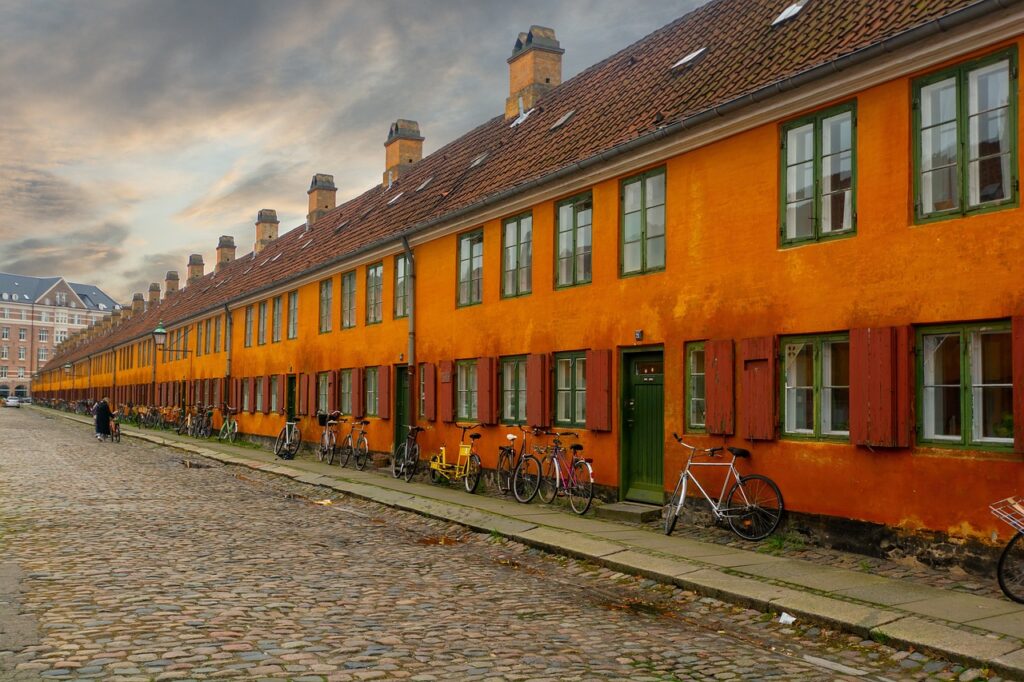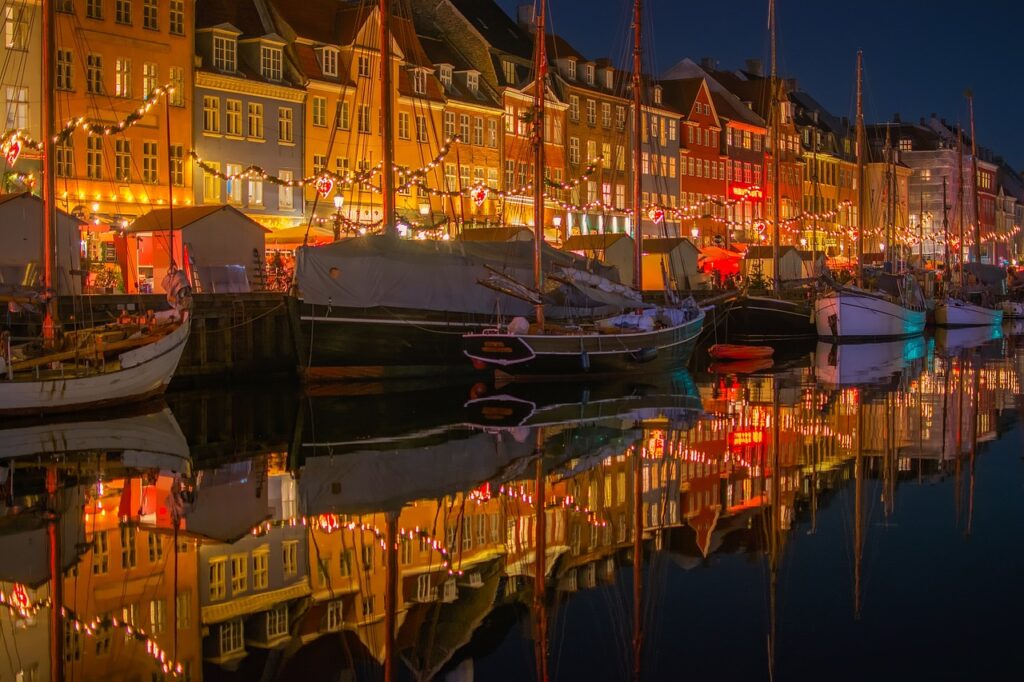Denmark does attract numerous tourists each year, offering a captivating blend of history, rich culture, and more. The country’s charm is indeed a magnet for wanderlust-stricken travelers, whether they are mapping out their dream vacation or geography enthusiasts eager to explore the wonders of this remarkable land. Before embarking on a Danish adventure, acquainting oneself with these fun facts about Denmark is a delightful precursor, offering a sneak peek into the unique charm and character of this extraordinary country and its people.
Fun Facts About Denmark:
Without further delay, let’s explore some of the most intriguing and noteworthy fun facts about Denmark!
The World’s Oldest Flag
Denmark proudly possesses the world’s oldest national flag, the Dannebrog. With a history dating back to the early 13th century, this iconic flag is renowned as the oldest continuously used national flag globally.
The Highest Point in Denmark Is Lower Than the Lowest Point in Switzerland
The highest point in Denmark is Møllehøj, which stands at just 171 meters (561 feet) above sea level. In contrast, the lowest point in Switzerland is Lake Maggiore, which is at an elevation of about 193 meters (633 feet) above sea level. Therefore, the highest point in Denmark is lower than the lowest point in Switzerland!
More Bicycles Than Cars
In Denmark, there are more bicycles than cars. Denmark is known for its strong cycling culture, and cities like Copenhagen have invested in extensive bike infrastructure, making cycling a popular and sustainable mode of transportation. The number of bicycles often surpasses the number of cars in urban areas, reflecting the emphasis on eco-friendly and healthy commuting options.
Danish Babies Sleep Outside
Yes, it’s a common practice in Denmark for babies to sleep outside, a tradition known as ‘udsoving’ or ‘udendørssøvn.’ This involves placing infants in their prams or strollers outside to nap, even in cold weather. The belief is that the fresh air provides numerous health benefits and helps babies develop better sleeping habits. Danish parents often embrace this practice as part of their parenting routine, as it is deeply ingrained in the country’s cultural norms. Interestingly, this is often one of the most surprising fun facts about Denmark!

LEGO: Building Blocks of Joy
Did you know that LEGO is a Danish brand? LEGO Group, the company behind the popular plastic brick construction toys, was founded in Denmark by Ole Kirk Christiansen in 1932. The name “LEGO” is derived from the Danish words “leg godt,” which mean “play well.” The company’s headquarters are still located in Billund, Denmark.
The Oldest Monarchy in Europe
One of the most popular fun facts about Denmark is that the oldest monarchy in Europe is the Danish monarchy. Established in the 10th century, it has a history dating back to Gorm the Old, who reigned from around 936 to 958. The current monarch, Queen Margrethe II, ascended to the throne on January 14, 1972. The Danish monarchy has a rich and continuous heritage, making it the oldest monarchy in Europe with an unbroken line of succession for over a thousand years.
The (Almost) Pancake-Flat Landscape
Denmark is known for having a predominantly flat landscape. The country is characterized by gentle rolling hills, plains, and low-lying areas. There are no towering mountains, and the highest natural point, Møllehøj, is only about 171 meters (561 feet) above sea level. This flat terrain makes Denmark particularly well-suited for activities like cycling and contributes to the country’s overall scenic charm.
Danish Coffee Culture
Denmark has a strong and pervasive coffee culture, with coffee being a central part of daily life. Danish people are avid coffee consumers, and the country consistently ranks among the top in terms of coffee consumption per capita globally. Coffee is enjoyed throughout the day, and the café culture is prevalent, providing social spaces for people to gather and relish their favorite brew. Whether it’s a quick espresso or a leisurely cup of filter coffee, Danes appreciate the ritual of coffee drinking
Pioneering Same-Sex Unions
In a groundbreaking move, Denmark became the first country to legalize same-sex unions in 1989. This progressive step set the stage for greater LGBTQ+ rights worldwide and showcased Denmark’s commitment to equality and inclusivity.

Swim in Copenhagen’s Harbor
Fancy a city swim? Yes, you can actually swim in Copenhagen’s harbor! The city has taken measures to ensure the cleanliness of the harbor waters, making it suitable for swimming. There are designated areas where locals and tourists alike can enjoy a refreshing dip during the warmer months. This initiative reflects Copenhagen’s commitment to creating a vibrant urban environment that seamlessly integrates water activities into city life.
The Archipelago of 444 Islands
Denmark isn’t just a single landmass—it’s a captivating archipelago of 444 islands! While not all are inhabited, the 76 that are offer diverse landscapes and lifestyles, inviting exploration through island hopping. This undeniably stands out as one of the exhilarating fun facts about Denmark, especially for those who harbor a love for the sea and the island culture of the northern countries.
Bluetooth’s Nordic Roots
Surprisingly, Bluetooth technology is named after a 10th-century Danish king. The name “Bluetooth” is derived from Harald “Bluetooth” Gormsson, a Viking king who ruled Denmark in the late 10th century. The technology was named after him due to his efforts to unite various tribes and promote communication, much like how Bluetooth technology unites different devices by enabling them to communicate wirelessly. The Bluetooth symbol itself is a combination of the initials of King Harald Bluetooth in Nordic runes.
Christmas Tree Dance Tradition
In Denmark, a delightful Christmas tradition involves dancing around a Christmas tree while holding hands. This festive custom is known as “julefrokost,” and it typically takes place during the holiday season. Friends and family gather, encircle the Christmas tree, and join hands in a joyful dance. The celebration is filled with laughter, music, and the warmth of shared moments!
The Not-So-Danish History of Denmark’s Beloved Pastries
One of the most unexpected fun facts about Denmark is that the famous Danish pastries are not actually Danish! Originating from Austria, these delectable treats were introduced to Denmark by Austrian bakers in the 19th century. Despite their international origins, the Danes have perfected the art of crafting these heavenly pastries, making them an integral part of Denmark’s culinary landscape.

Fun Facts About Denmark: Conclusion
The above were just a few fundamental fun facts about Denmark, and perhaps these morsels of information can serve as a catalyst for you to discover much more about this wonderful country. After all, if you found this article intriguing, it’s a given that you’ll experience exponentially greater fascination exploring the landscapes, landmarks, traditions, and culture of Denmark on a future visit!
